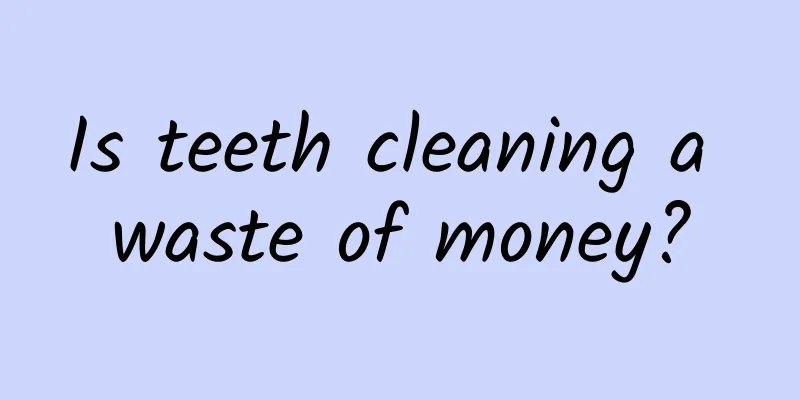Is teeth cleaning a waste of money?

|
More and more people are beginning to realize the importance of dental health. It is very important to keep healthy teeth and clean your teeth regularly. However, there are still many people who don't know much about teeth cleaning. They are afraid of teeth cleaning, think that teeth cleaning is a waste of money, and even think that doctors are cheating them. The oral cavity is a bacterial environment. Within 12 hours after brushing your teeth, bacteria will adhere to the tooth surface, between teeth, and in the gingival sulcus, forming a dental plaque biofilm that cannot be washed away by water or rinsed. After 10 to 30 days, the dental plaque biofilm reaches its peak. The bacteria that constantly "grow, die, eat, drink, defecate and urinate" on your teeth begin to mineralize, forming pigment deposits and dental calculus. At this time, your gums have actually been quietly inflamed, which is the reversible gingivitis stage. You begin to notice bleeding when brushing your teeth and bad breath. After one month, under the constant stimulation of dental plaque, the scope of gingival inflammation spreads deeper, causing the destruction of tooth supporting tissues: the gingival sulcus deepens and the alveolar bone is absorbed. At this stage, it is irreversible periodontitis, and then the gingival hyperplasia, pus discharge or gingival recession, sensitivity, bad breath, food stuck in the teeth, loose teeth, and even tooth loss in severe cases will occur. In addition, epidemiological surveys show that the prevalence of periodontal disease in my country is 70% to 85%. Teeth cleaning can remove dental calculus, eliminate inflammation, restore soft tissue morphology, maintain alveolar bone height, and timely detect oral problems during teeth cleaning, which is the first step in oral treatment in the doctor's mind. What is teeth cleaning? Teeth cleaning, also known as teeth cleaning or dental scaling, is a method used by doctors to remove dental plaque and tartar from the mouth. It is also a method of daily oral health care. There are two main ways to clean teeth: ultrasonic cleaning and sandblasting. The principle of ultrasonic cleaning is to remove tartar by breaking it up through ultrasonic vibration, and then use water mist to rinse and use a scaler to remove tartar. Ultrasonic cleaning is more effective in removing tartar. However, for some exogenous stains on teeth, especially smoke stains and tea stains in the pits and fissures of teeth or in the gaps between teeth that are difficult to remove with ultrasonic cleaning, sandblasting should be used. The sandblasting machine uses high-pressure airflow to spray a crystal salt onto the surface of the teeth to remove dirt on the surface and gaps of the teeth, making the teeth whiter. Generally, sandblasting is performed after ultrasonic cleaning, and the effect is better if it is combined with tooth surface polishing. Many friends may have questions: I brush my teeth carefully every day, is it necessary to clean my teeth? In fact, although we brush our teeth carefully every day, ordinary toothbrushes can only brush the surface of teeth, not to mention that there are 40% blind spots that toothbrushes cannot reach. In these invisible gaps between teeth, there will still be a large number of bacteria and foreign matter remaining, which will cause a series of oral problems over time. Regular teeth cleaning can remove tartar and plaque, help us eliminate the inflammation they cause, restore the morphology of soft tissue, and maintain the health of gums. Questions about teeth cleaning ● Teeth cleaning will make the gaps between teeth bigger and loosen the teeth The widening of the gaps between teeth has nothing to do with teeth cleaning, but is due to dental plaque. Because dental plaque mostly grows near our gums and in the gaps between teeth, it blocks and irritates the gums, causing gum atrophy. Over time, the gaps between teeth become larger and larger. After teeth cleaning, the inflamed gums no longer swell, the gums return to health, the dental plaque is removed, and the gaps between teeth are naturally exposed. Similarly, loose teeth are also due to the swelling of the gums after teeth cleaning and the removal of various substances attached to the gums, which creates a loose feeling. If the looseness is severe, it means that gum atrophy and periodontal disease may have occurred, and targeted periodontal treatment is required. Why does teeth cleaning cause bleeding? This is because dental plaque has long stimulated the gums and periodontal tissues, leading to periodontitis bleeding. After teeth cleaning, the dental plaque is removed and the inflammation will be relieved. ● Teeth become sensitive after teeth cleaning Many people will feel toothache one or two days after teeth cleaning, and are very sensitive to hot, cold, sour and sweet. This is mainly because the neck and root of the tooth are sensitive to begin with, and after teeth cleaning, they lose the "protection" of dental plaque and are suddenly completely exposed to the outside world. Don't panic if you encounter this situation. For mild cases, just avoid hot and cold stimulation for a few days and you will slowly adapt. For patients with particularly serious cases, follow-up supplementary treatment can be carried out according to the doctor's advice. Things to note after teeth cleaning Do not suck hard, lick with your tongue, or touch your gums with your fingers after teeth cleaning. Do not use dental floss or toothpicks within a week to prevent unexpected bleeding. If bleeding suddenly occurs for some reason after cleaning your teeth for a period of time, please seek medical treatment in time. Do not eat too spicy or too sour or cold food within three days after teeth cleaning. One or two months after teeth cleaning, some people with sensitive constitutions may experience tooth allergies to cold, hot, sour, sweet and other stimuli. This is a normal individual reaction, so please do not worry too much. If the symptoms continue to worsen and cannot be relieved, please return for a follow-up visit in time. After teeth cleaning, teeth are a little sensitive to hot and cold, and are prone to soreness. This symptom is temporary and usually disappears in about a week. If the soreness persists, you can consider using some anti-sensitive toothpaste sold on the market, which will generally improve after about a month of use, or seek help from a doctor. Although teeth become clean after teeth cleaning, if you neglect to clean them, dental plaque will grow again soon, so you should brush your teeth frequently. It is recommended to clean teeth regularly, and the cleaning cycle varies from person to person. Generally speaking, the cleaning cycle for patients with periodontal disease should be once every 3 to 6 months, and ordinary patients can be cleaned once every six months or one year, depending on the advice of the dentist. I hope every friend can pay attention to dental health, do regular check-ups and teeth cleanings, and have healthy teeth. |
<<: Strictly follow the principle of "moderation" when eating meat
>>: Scientific research on organs: Was Daiyu infected with tuberculosis? (Part 2)
Recommend
What is the reason for the cough after several months? How to treat the cough with traditional Chinese medicine?
There are many reasons for coughing, such as cold...
Can I use my mobile phone during early pregnancy?
In the early stages of pregnancy, pregnant women ...
What is intrauterine bleeding? Is intrauterine bleeding serious?
Intrauterine bleeding is a disease that can endan...
Can I eat green dates for medical abortion?
I believe many people know that people are very w...
Under what circumstances will the early pregnancy test paper show a false positive
Many women of childbearing age, if they have norm...
Causes of hemorrhage during miscarriage
There will be heavy bleeding at the beginning of ...
After "Yang Kang", still coughing, shortness of breath, pain? Seek medical attention for these warning signs! Highlights →
Recently Beijing Municipal Health Commission rele...
What causes sudden itching of the vulva?
Female friends are often troubled by gynecologica...
What are the types of scented teas? Which scented tea tastes better?
Scented tea is a common type of tea in life. It i...
【Doctors Talk About Medicine】Hand Hygiene: The First Line of Defense in the Healthcare Environment
...
Can a false positive occur before menstruation?
Menstruation is a normal physiological period for...
How to regulate high estrogen levels
If the estrogen level in the body of female frien...
When is the right time to add soy sauce to steamed fish? Should the soy sauce be added after the fish is cooked or during steaming?
We all know that steamed fish soy sauce is a comm...
What if the test strip shows no pregnancy but I don't have my period?
Generally, when a woman misses her period, the fi...









